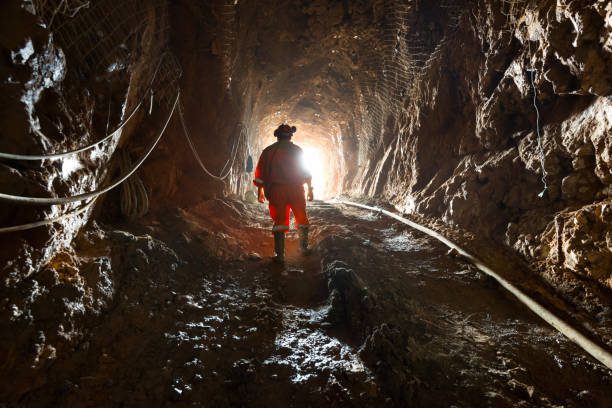
| Miner Key Stats | |
|---|---|
| Avg. Salary / year | $86,720 |
| Avg. Pay / hour | $41.69 |
| Education | 1-2 Years |
| Job Outlook | 4% |
Miners can be experienced in extracting a variety of material and natural resources from the earth.
Some specialties and industries within mining can include: oil and gas, minerals and non-mineral materials such as coal.
This article provides more information on Mining Engineers, an important profession that plans and designs mines for the safe removal of natural resources from the earth.
Individuals who want to become a Miner are encouraged to work on educational requirements as well as have some personal skills and characteristics that are useful in this field.
Individuals who like to study math and the natural sciences in high school are encouraged to look into a career in Mining Engineering.
Table of Contents
Education Requirements to Become a Miner
Individuals who want to become a Miner and work as a Mining Engineer will need to fulfill educational requirements and have some personal characteristics to succeed in this profession.
Individuals must have a minimum of a bachelor’s degree, some work experience and seek a license, depending on state requirements.
Individuals who want to become a Miner and a professional Engineer will need a minimum of a bachelor’s degree.
While they are enrolled in high school, individuals can prepare for an engineering degree by taking more classes focused in mathematics and science classes such as physics and trigonometry.
As an undergraduate, individuals should focus on an Engineering degree in order to enter this profession.
Individuals are encouraged to complete a program accredited by ABET, a nonprofit organization offering accreditation to engineering programs.
Not many colleges or universities offer mining engineering programs.
Individuals who attend a college or university that doesn’t offer this type of program are encouraged to take additional classes in mathematics, mine design and safety, thermodynamics, physics and geology.
Engineering programs include coursework that focuses in a classroom and laboratory setting.
Individuals who want to become a Miner and focus a career as a Mining Engineer may also be required to secure a license, depending on the industry they work in.
For example, Mining Engineers whose services are offered directly to the public are required to be licensed in their state.
Individuals can visit the National Council of Examiners for Engineering and Surveying for more information on how to become licensed in this field.
Miner Job Description
Mining Engineers play an integral role in the planning and designing of mines.
Their role focuses on the safe and efficient removal of natural resources from the earth.
Mining Engineers typically specialize in a specific natural resource, mineral or metal.
For example: oil, gold, coal, metallic ores, phosphates and salt.
Mining Engineers will work on designing, developing and determining the safest and most efficient way to extract a natural resource or element.
These professionals will start with determining the best type of mine to design: an open pit or underground mine.
They will design the mine and oversee the construction of mine shafts and tunnels.
They are also responsible for determining the most efficient transportation method to transfer extracted material to processing plants.
They will also monitor production to determine whether their plan is effective and that the operations in the mines are progressing in a safe manner.
Miner Salary and Career Path
In 2012, the median salary for Mining and Geological Engineers was approximately $84,320 per year.
Exact wages will depend on a variety of factors including the type of natural resources an individual mines, years of experience and supervisory duties.
The job outlook for mining and geological engineers is expected to grow at an average pace when compared to other professions.
Job opportunities for mining and geological engineers are expected to grow by 12 percent through the year 2022.
There is an impact on job opportunities for mining engineering in oil extraction due to federal restrictions for coal deposits that have been located on federally protected land.
These type of restrictions will limit the work mining engineers are able to produce reflecting upon this profession.
However, many of earth’s natural resources allow mining professionals to explore these avenues for mining productions.
Individuals who would like to pursue a career as a Mining Engineer can look forward to a challenging career that entails a lot of planning, mathematics, designing and the use of analytical skills.
This is a great career choice for individuals who like to work onsite at mining operations or at an in office job site.
![]() The below information is based on the 2021 BLS national averages.
The below information is based on the 2021 BLS national averages.
National Average Salary
$100,450Average Salary by State
| State | Avg. Annual Salary |
|---|---|
| Alabama | $86,720 |
| Alaska | $124,380 |
| Arizona | $85,020 |
| California | $141,170 |
| Colorado | $120,990 |
| Florida | $94,280 |
| Georgia | $81,080 |
| Idaho | $113,150 |
| Illinois | $91,740 |
| Indiana | $92,290 |
| Iowa | $82,020 |
| Kentucky | $91,310 |
| Massachusetts | $106,140 |
| Michigan | $70,920 |
| Minnesota | $108,820 |
| Missouri | $97,330 |
| Montana | $92,230 |
| Nebraska | $83,880 |
| Nevada | $101,970 |
| New Jersey | $81,180 |
| New Mexico | $128,010 |
| New York | $91,300 |
| North Carolina | $96,660 |
| Ohio | $88,650 |
| Oklahoma | $145,360 |
| Oregon | $101,870 |
| Pennsylvania | - NA - |
| South Dakota | - NA - |
| Tennessee | $79,340 |
| Texas | $118,840 |
| Utah | $81,610 |
| Virginia | $102,950 |
| West Virginia | $94,080 |
| Wyoming | $99,950 |
The top earning state in the field is Oklahoma, where the average salary is $145,360.
These are the top 5 earning states in the field:
* Employment conditions in your area may vary.
Frequently Asked Questions
What does a miner do?
Miners extract coal, ore and other minerals from the earth.
Their job duties may include operating power drills, using explosives or air charges to extract materials, shoveling materials, and installing timbers or cribs to support walls and roofs.
The exact responsibilities depend on the place of employment and the miner’s specialty.
Some miners operate mining machines to tear out coal, others drive bulldozers to move large objects around, others repair the machines or build tunnels and other miners are responsible for protecting other workers from accidents.
Underground miners need good reflexes, the ability to work in cramped spaces, and good general health.
This work is physically strenuous and accidents sometimes occur, so as a miner you have to always be alert.
Coal miners are also at risk of developing lung disorders because they inhale coal dust.
How much does a miner make?
Salaries in the mining sector vary depending on the industry.
According to a study published by the Bureau of Labor Statistics, employees who work in private mining, quarrying and oil and gas extraction industries earned, on average, $102,000 a year in 2017 while those who work in oil and gas extraction earned $166,000 a year.
How much does it cost to become a miner?
Most miners learn this trade on-the-job by working alongside experienced miners.
You can find entry-level employment in this field without any formal education and advance to better-paying positions after gaining a few years of experience.
However, as more mines are starting to use sophisticated machines and methods, having some training in the field can give you an advantage in the job market.
Mining classes can cost anywhere between a few hundred dollars and $2,000-$3,000, depending on the program and the school you choose.
If you want to study this field even further and become a mining engineer, you can choose to complete a 4-year bachelor’s degree program that will cost you around $30,000-$40,000 a year.
What is the demand for miners?
The numbers published by BLS show that there were a little more over 328,000 people employed in the mining industry in 2018.
Employment in this field varies year by year and region by region.
Your employment prospects also depend on your skills and the employer’s requirements.
How long does it take to become a miner?
Although there are no formal educational requirements for miners, many states require underground miners to be at least 18 years of age.
As complex machines are often used in mining operations, having some training in the field can help you find a better-paying job.
Courses are offered especially at colleges located in mining regions.
You can earn a certificate in mine studies in 1 year or an associate’s degree in 2 years.
As you gain a few years of work experience you can be promoted to better-paid positions.













